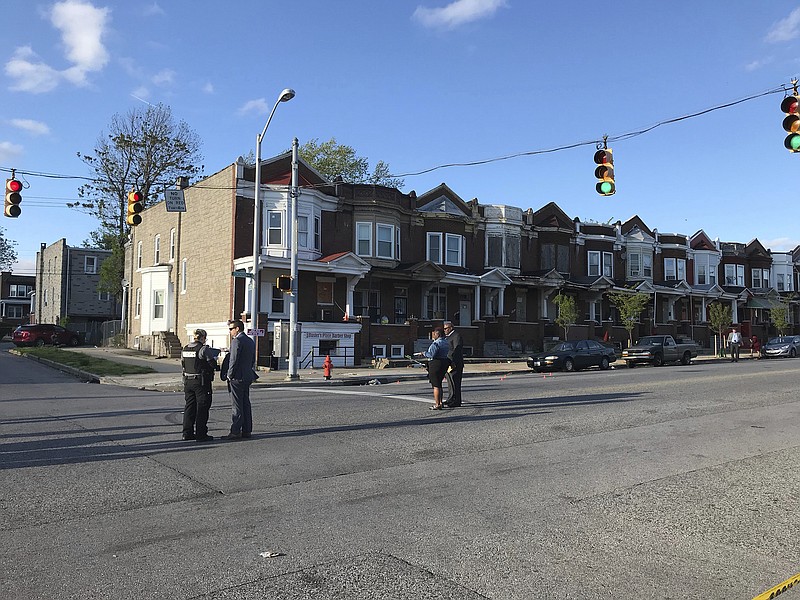He started it. No, he started it.
In the playground-as-politics milieu of Washington, D.C., President Donald Trump and U.S. Rep. Elijah Cummings, D-Maryland, swerved into a debate earlier this week that they ought to have. Only they won't have it and will only call each other names.
And Baltimore, the subject of the debate and the largest city in Maryland, will remain on the brink of urban collapse.
It all began last week with Cummings taking issue with Trump's border policy. Cummings is a Democrat and as such not interested in working with the White House on solutions. He, like most of his colleagues, would rather spew charges and half-truths and outright lies.
The president, by now, knows that, but he can't leave a criticism unrebutted. So, as is his way, he attacked the speaker by denigrating his city.
"[H]is Baltimore district is FAR WORSE and more dangerous" than the border, Trump said earlier this week in a tweet. "His district is considered the Worst in the USA."
The area Cummings serves, he suggested, is "a disgusting, rat and rodent infested mess."
The Maryland congressman, like many in the district he serves, is black.
That resulted in the repeated calling of Trump, by colleagues of Cummings, the country's perhaps least meaningful word: "racist."
So overused, misused and abused is that word by the American left, and about the president, that it has lost much of its impact.
And, unfortunately, Trump was correct about Baltimore being dangerous. He couldn't have cited the facts if he wanted to, but the fact is Baltimore has the highest crime rate in the 30 largest American cities and is second to Detroit for the highest rate of violent crime. It is in the top 10 of least livable cities in America, as measured by a 24/7 Wall Street index, and exterminator Orkin has listed it in the top 10 of its annual survey of "rattiest cities."
In the wake of its 2015 riots, the New York Times Magazine wrote of Baltimore in May ("The Tragedy of Baltimore"), the city has experienced "nothing less than a failure and governance the like of which few American cities have seen in years."
"You would think that you were in a Third World country," Sen. Bernie Sanders, I-Vermont, said during a tour of Cummings' district in 2015. "There are hundreds of buildings that are uninhabitable. Residents of Baltimore's poorest boroughs have lifespans shorter than people living under dictatorship in North Korea. That is a disgrace."
(Of Trump's recent remarks, the hypocritical Sanders said it was "unbelievable that we have a president of the United States who attacks American cities.")
Now, Baltimore's front door is beautiful. It's Inner Harbor area is a lovely place for tourists to stroll, eat and visit attractions, and its Camden Yards is a wonderful place in which to take in a baseball game. But many areas in the once thriving city struggle.
Congressional representatives don't have the ability to change the trajectory for cities as much as mayors do, but Cummings represents the same party that has led the city and many others around the country for half a century or longer. Yet, the problems fester under Democratic rule, including Baltimore, which didn't seem to reap much from a $1.8 billion stimulus package former President Barack Obama granted the city a decade ago.
Trump, probably centrally, was trying to gore Cummings for his recent border comments. But like all of his tweets that make Democrats squirm and squeal, they had more than an element of truth in them. What has one-party rule in the city gotten its residents? Another day older and deeper in poverty.
The president, without saying so, also was inviting the congressman's constituents to vote for the candidate under whose leadership black unemployment reached its lowest point since rates first were taken.
We wish Trump had also taken the time to invite Cummings and Baltimore's mayor to the White House to talk about what might be done for Charm City. They may not have come, but Trump would have been the more magnanimous of the sides for making the invitation.
Many of the country's largest cities could use a dose of out-of-the-box thinking (not necessarily from the president but with White House help) from its defenders instead of falling back on the same "give-us-more-money" mantra that has left them where they are - calling the president "racist," failing one more year of school children and shuttering 10 more buildings.
